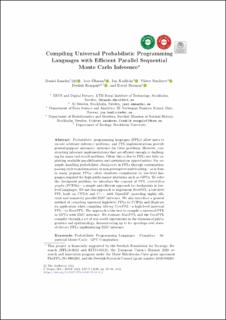Compiling Universal Probabilistic Programming Languages with Efficient Parallel Sequential Monte Carlo Inference
Chapter
Published version
Permanent lenke
https://hdl.handle.net/11250/3041011Utgivelsesdato
2022Metadata
Vis full innførselSamlinger
- Scientific articles [2181]
Originalversjon
10.1007/978-3-030-99336-8_2Sammendrag
Probabilistic programming languages (PPLs) allow users to encode arbitrary inference problems, and PPL implementations provide general-purpose automatic inference for these problems. However, constructing inference implementations that are efficient enough is challenging for many real-world problems. Often, this is due to PPLs not fully exploiting available parallelization and optimization opportunities. For example, handling probabilistic checkpoints in PPLs through continuation-passing style transformations or non-preemptive multitasking—as is done in many popular PPLs—often disallows compilation to low-level languages required for high-performance platforms such as GPUs. To solve the checkpoint problem, we introduce the concept of PPL control-flow graphs (PCFGs)—a simple and efficient approach to checkpoints in low-level languages. We use this approach to implement RootPPL: a low-level PPL built on CUDA and C++ with OpenMP, providing highly efficient and massively parallel SMC inference. We also introduce a general method of compiling universal high-level PPLs to PCFGs and illustrate its application when compiling Miking CorePPL—a high-level universal PPL—to RootPPL. The approach is the first to compile a universal PPL to GPUs with SMC inference. We evaluate RootPPL and the CorePPL compiler through a set of real-world experiments in the domains of phylogenetics and epidemiology, demonstrating up to 6× speedups over state-of-the-art PPLs implementing SMC inference.

